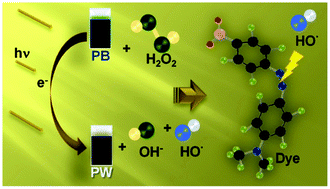Carbon nanotube/Prussian blue nanocomposite film as a new electrode material for environmental treatment of water samples†
Abstract
The use of carbon nanotube/Prussian blue nanocomposite film as a new electrode material for the environmental treatment of water samples is reported. The application of photochemical, electrochemical and photoelectrochemical-based Fenton processes were investigated for methyl orange dye degradation. The effect of the operating parameters, such as hydrogen peroxide concentration and applied potential, was established using factorial experimental design. Surface-contour plots revealed how the interaction of the parameters influenced the system response maximum. A methyl orange degradation of 98% was achieved at neutral pH, room temperature, small amount of catalyst, low overpotential (0.0 V vs. Ag/AgCl) and very low amount of H2O2 (1.0 mmol L−1). Moreover, since the carbon nanotube/Prussian blue nanocomposite film is very stable and can be reused without a loss of catalytic activity, this new electrode material is shown to be applicable to wastewater treatment.


 Please wait while we load your content...
Please wait while we load your content...